Spanish GP: Could Mercedes be F1's very first invincibles?

Last updated on .From the section Formula 1
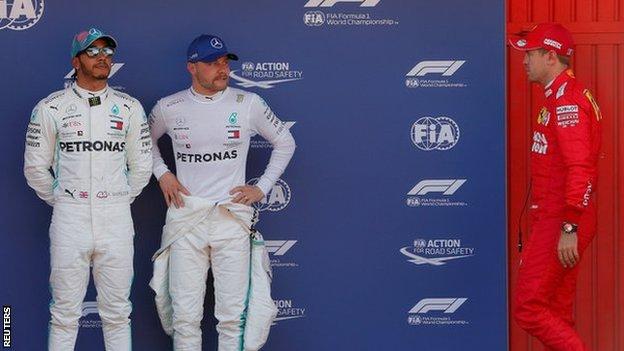
Could Mercedes win every race of this Formula 1 season?
Toto Wolff, their Formula 1 boss, first laughed at the question after the team's fifth consecutive one-two in five races this year, and said: "Don't say that" - because he was worried about 'commentator's curse' - then said: "No."
"First of all," he said, "you need to stay humble and keep both feet on the ground. We have had five fantastic performances and five one-twos but we don't take it for granted. It is not just saying it. It is really the mindset we have."
It is the mindset that has created arguably the greatest team in the history of Formula 1. Wolff also said in Spain over the weekend that Mercedes' focus was on winning their sixth consecutive drivers' and constructors' championship double - which would break the record of five that Ferrari and Michael Schumacher established at the start of this century.
After their crushing performance on the Circuit de Barcelona-Catalunya, that already looks close to a certainty.
Utter Mercedes domination
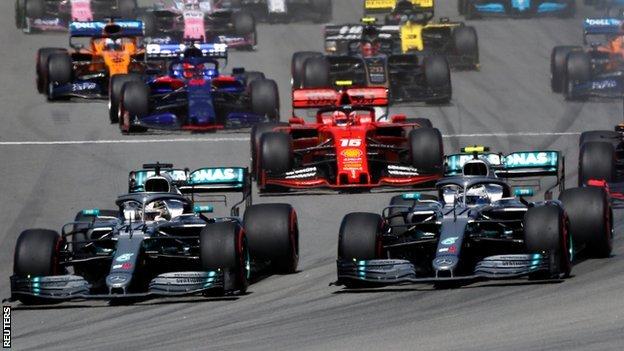
Lewis Hamilton took back the championship lead from team-mate Valtteri Bottas after beating the Finn away from the line and dominating the race thereafter, and heads the Finn by seven points.
The more relevant number at this stage is that Hamilton is a massive 46 points ahead of the closest non-Mercedes driver, Red Bull's Max Verstappen, with the Ferrari drivers Sebastian Vettel and Charles Leclerc close behind.
That is already nearly two clear race wins. After just under a fifth of the season has gone. When Mercedes have the best driver, in the best car, run by the best team, it's hard to see how anyone can come back from that.
The huge advantage the Mercedes drivers have built up in the championship is not solely down to the performance of their car. Ferrari were potential winners in two of the first four races. An engine problem robbed Leclerc of victory in Bahrain, and a qualifying crash by the 21-year-old probably cost him pole, and potentially victory in Azerbaijan.
Even so, the Mercedes was on balance the fastest car, and that position was consolidated by an imposing performance around the Circuit de Barcelona-Catalunya.
What happened to Ferrari?
Ferrari arrived in Spain hoping to at least match Mercedes, on a track where they had looked very strong in pre-season testing, with a major aerodynamic upgrade combined with a new, improved engine.
But Mercedes also had an upgrade - on aerodynamics only - and it trumped Ferrari's. To say the least.
Insiders say the revisions to the front wing and barge-board area were worth as much as 0.4 seconds a lap, and it looked it as Bottas took pole position by 0.6secs from Hamilton, and 0.8secs ahead of the fastest Ferrari.
Bottas is in a rich vein of form, and he had looked the main man for most of the weekend. But much of the gap to Hamilton was explained by a messy build-up to the world champion's lap, and a scrappy lap. The track then fell away for the second runs and pole was Bottas' - the third in a row.
Ferrari had been expecting it after practice, but still they were crestfallen, and the race provided no better news.
Vettel got a great start and was three-wide with Hamilton and Bottas into the first corner, but he had to back out, ran wide, and was rather rude to his team-mate when he rejoined at the exit of Turn Two.
Leclerc at that point was in third place, having taken advantage of Max Verstappen being baulked behind Bottas, but Vettel ran out to the edge of the track as if his team-mate was not there. Leclerc had to back off and that cost him third to the Red Bull - a place neither Ferrari driver was able to reclaim over the course of the race, during which Vettel and Leclerc battled with each other with team interventions to order one past the other twice, yet again.
Ferrari's fans, it was pointed out to Vettel, will not be thrilled by the events so far in a season that started with such high hopes.
"Not just the tifosi," he said, "but inside the team we are also not happy. It is what it is and we have to look at the positives and try to build on those. Very quickly the next races are coming up. We need to stay focused and do our job and I am sure it will come.
"Obviously [this weekend was a] big step back in terms of pace with Mercedes being far away, but it is what it is. I know everybody is very keen to do better but it is a question of time. It is not easy. Other people are doing a very good job and you need to respect that."
As a car, the Mercedes has generally - Australia and Spain excepted - not been that far ahead of everyone else. But it is ahead, and the team and drivers are operating on such a high level that the others simply have had no chance.
Don't Mercedes normally struggle in Monaco?
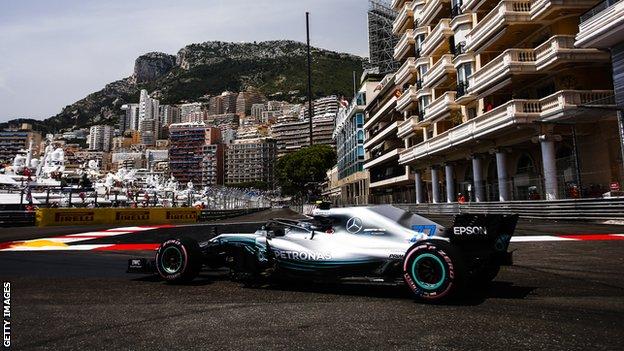
In the past, there might have been hope that the next race, in Monaco, would provide succour for their rivals. In the past two years, Mercedes have struggled around the streets of the Principality and Red Bull and Ferrari have been more competitive. And Wolff emphasised that on Sunday.
"Next weekend is a tremendous challenge for us," he said. "We have not performed well in Monaco these last years and you remember how strong [Daniel] Ricciardo was in the Red Bull there last year. They were in a league of their own.
"You need to take one step at a time. There is a next weekend that looks challenging on paper and it is massively exciting for us to go there. I wish we could go there tomorrow. And everybody is working flat-out to try to understand the car for Monaco and really be strong there. Let's look at the next race and try to go well there."
But this year is different to 2017 and 2018.
In previous years, the track characteristics of Monaco exposed the weaknesses of the Mercedes cars. But this year, the Mercedes has added speed in slow corners to its unsurpassed pace in medium- and high-speed. In fact, its biggest advantage in Spain was in the final sector, a group of slow-speed corners which is regarded as a good indicator for Monaco form. So prospects for anything other than a Mercedes victory are bleak.
Red Bull are known for the quality of their chassis, especially on low-speed tracks like Monaco. Verstappen did say he expected Red Bull to be stronger in Monaco than in Spain, but he added: "At the moment we are not really better in any corner than Mercedes. It's not that it's a bad car. Mercedes is just a bit quicker than us everywhere. Medium-speed, high-speed is similar but on this track they were very strong in the low-speed corners and that is pretty good for Monaco as well."
Could it be a conceptual problem for Ferrari?
Why is the Mercedes so strong, and why have Ferrari struggled so much? The answer could be in the concept of their cars.
As BBC Sport's secret aerodynamicist explained at the start of the year, Mercedes and Ferrari have taken a different approach to their front-wing design and subsequent airflow around the car.
His article said before the season that Ferrari's approach - which is about aerodynamic consistency rather than maximum downforce - could lead them down a development cul-de-sac and restrict their car's potential.
As one of Ferrari's fundamental problems compared to Mercedes seems to be a lack of downforce, this is a growing discussion point in the paddock.
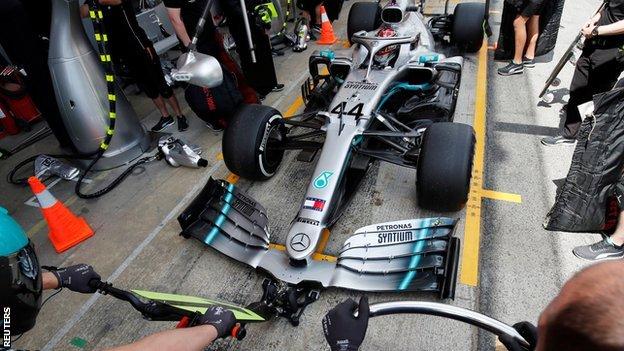
Wolff said: "It is definitely an interesting thought because when you see who was in front in winter testing it is different from the ones who were in front today.
"It was two different aerodynamic concepts. Maybe there is a certain truth in it. But there is never one question and one answer in F1 or silver bullet that justified good or bad performance, we have to develop the car and try to add performance from weekend to weekend.
"We felt with the front wing concept we followed there is more potential long-term maybe with the risk of a short-term struggle."
If this is the case, it is potentially terminal for Ferrari's hopes this year, because to change it they would have to alter the entire aerodynamic philosophy of their car. Which is almost impossible to do during a season.
Binotto even hinted at this after the race on Sunday. "It is a matter of downforce, of balance, of maybe even car concept," he said on the subject of their shortfall. "We do not have the answer."
So, can they do it?
While Ferrari toil to improve, Mercedes' focus is on delivering excellence every weekend.
"It's been quite a journey in this team," Wolff said, "and what I have discovered is that the energy levels, contentment, is higher than ever.
"We enjoy what we do and we want to continue to push the needle and that is an exciting objective. And if you find your purpose within the group that is on that journey, you have a very strong force.
"When you walk around, what you hear and see is content people who enjoy what they do.
"It is a calm, positive atmosphere and a tremendous privilege to be in a situation where we have won five championships and we have earned the possibility of going for a sixth one that hasn't been done before, that hasn't been done before in any sport on a world championship level and that is something that unites us on that journey."
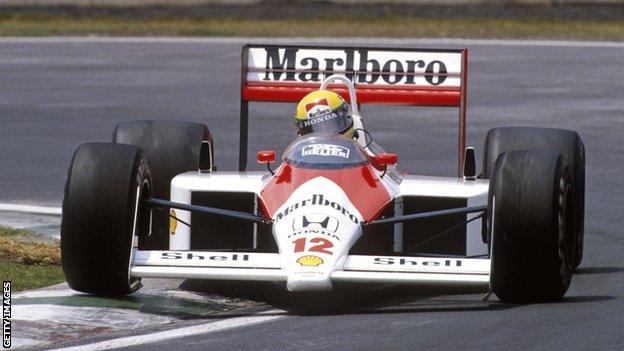
The other record that has not been achieved is to win all the races in a single season. The closest anyone has ever got is McLaren-Honda with Ayrton Senna and Alain Prost in 1988, when a clean sweep of 16 races was prevented only by Senna tangling with a backmarker when on his way to victory at the Italian Grand Prix.
That incident underlines why it's so difficult to achieve. Not only does the car have to work at every track, but the team is relying on at least one driver avoiding trouble at every single race. The law of averages - reliability, incidents, weather, bad luck and so on - dictates that is extremely unlikely.
But Wolff is wrong to say it's not possible. Of course it is.
Vettel was asked whether he feared Mercedes winning every race. "No," he said. Binotto? "It is too early for such an assumption."
Hamilton's answer was this: "Who knows? We definitely didn't expect to come into the season and win all five races and that is already incredibly encouraging for everyone.
"Everyone is pushing so hard which is great to see and it really is a phenomenal group. No one is overly confident. We are discussing what we can do better.
"It is the strongest team there has ever been, I think. It will be very, very hard to break that."





Comments
Join the conversation
this is not a new thing RBR Ferrari Williams and Mclaren have all done it
when you get a group of good people all in one place its by nature gonna happen
normally it only end when there is a big rule change or people leave to go elesewhere
Yes it is a shame that Ferrari conspire to shoot themselves in the foot at every turn and it is not the first time that we have seen one team/driver dominate, Williams through the 90s, Schumacher at Ferrari, Vettel at Red Bull, McLaren with Senna and Prost. I think we have to credit Mercedes who find ways to win races they probably shouldn't, and the drivers for squeezing all speed.
THESE ARE LIES.
Rosberg was cheating and getting away with it & that is why Lewis fell out with him.
Pundits should stop lying to us.
HAMMERTIME!!
Whoops! At least he stayed to the end. Parade.
Martin Brundles face was particularly amusing today, he looked like a broken man as he moaned about Hamilton winning.
Mercedes has had a reputation for being all engine over the past few seasons, but this season the chassis is clearly one of the best also.
Hard to see what anyone else can do right now. I know some find it boring, but I find it truly amazing and impressive.
They simply can't give out set out any correct plans between Vettel n LeClerc, it's probably the reason why at the moment they are both racing EACH OTHER rather than the opposition.
"You will have to change F1, cos even a dedicated fan like me is getting disillusioned"
I don't understand how Mercedes are to blame (especially when you read some comments).
The cars can follow closer and there's been more overtaking than last year but Ferrari have taken the wrong direction aerodynamically & Binotto is making terrible decisions with poor Leclerc.
That's why tracks like Silverstone and Brazil HAVE to stay on the calendar